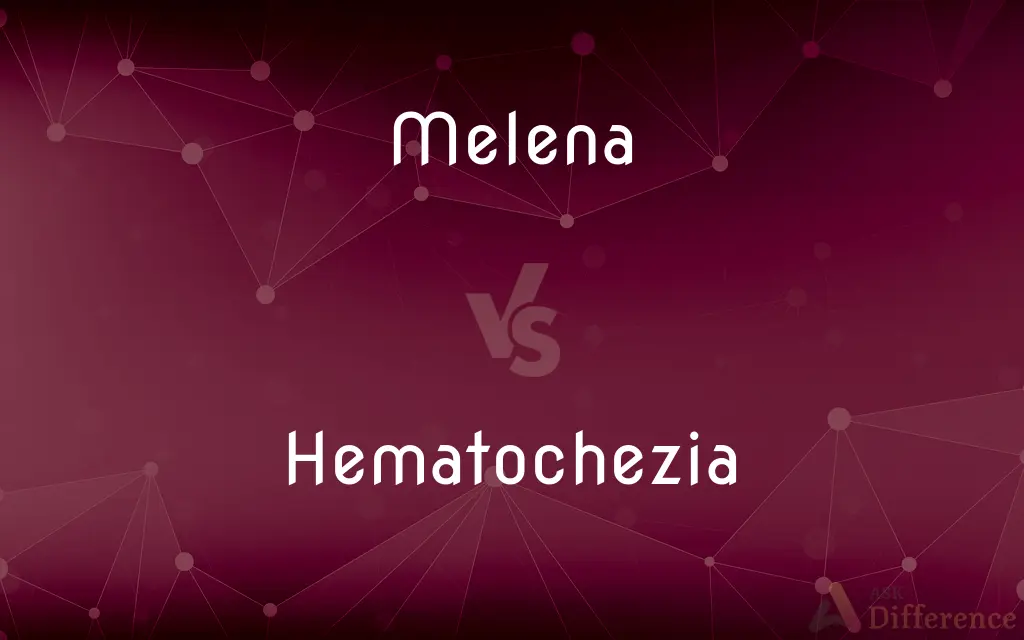Melena vs. Hematochezia — What's the Difference?
By Tayyaba Rehman — Updated on October 9, 2023
Melena refers to black, tarry stools due to digested blood, while Hematochezia involves bright red blood in stools, indicating lower gastrointestinal bleeding.

Difference Between Melena and Hematochezia
Table of Contents
ADVERTISEMENT
Key Differences
Interestingly, Melena speaks to an internal bleed that has allowed the blood to mingle and be altered by digestive processes, producing the distinctive dark, tarry appearance of the stool. In a diagnostic scope, the manifestation of Melena often propels medical practitioners to scrutinize the upper parts of the GI tract, like the stomach or the small intestine, for potential bleeding sources. Hematochezia, with its exhibition of fresher, red blood, generally directs attention toward the lower aspects of the GI tract, such as the colon, rectum, or anus, as possible sites of bleeding.
Tayyaba Rehman
Oct 09, 2023
An impactful divergence between Melena and Hematochezia pertains to their diagnostic and clinical implications. The presentation of Melena, signaling an upper GI bleed, often invokes investigations like endoscopy to explore the esophagus, stomach, and upper small intestine, maneuvering through a pathway that could contain swallowed blood. Alternatively, Hematochezia may instigate a colonoscopy, probing the colon and rectum for sources of bleeding, given its association with the lower GI tract.
Tayyaba Rehman
Oct 09, 2023
Melena and Hematochezia both relate to the presence of blood in feces, albeit with variances pertaining to color and implicated location of bleeding within the gastrointestinal (GI) tract. Melena is characterized by black, tarry stools, a manifestation resultant from the digestive processes acting upon blood, typically indicative of bleeding in the upper GI tract. Contrarily, Hematochezia, characterized by the elimination of fresh, bright red blood through the anus, usually signals bleeding in the lower GI tract.
Tayyaba Rehman
Oct 09, 2023
The assessment and subsequent management of Melena and Hematochezia are necessarily divergent, given the distinct anatomical regions they imply as the source of bleeding. With Melena, medical practitioners might prioritize evaluating potential ulcerations or varices in the upper GI region. Conversely, in instances of Hematochezia, potential etiologies such as hemorrhoids, anal fissures, or colorectal polyps might be at the focal point of investigation and management.
Tayyaba Rehman
Oct 09, 2023
Although Melena and Hematochezia both signify gastrointestinal bleeding, their implications, investigative pathways, and management strategies distinctly bifurcate, attributed to the differing locational cues they provide about the origin of the bleed. Their identifications as symptoms, hence, are pivotal in navigating the course of clinical and diagnostic endeavors, providing insights into the underlying pathologies that necessitate addressal and intervention.
Tayyaba Rehman
Oct 09, 2023
ADVERTISEMENT
Comparison Chart
Possible Causes
Ulcers, varices, etc.
Hemorrhoids, colorectal polyps, fissures, etc.
Tayyaba Rehman
Oct 09, 2023
Associated Ailments
Possibly peptic ulcer disease
Potentially diverticular disease
Tayyaba Rehman
Oct 09, 2023
ADVERTISEMENT
Definitions
Melena
Stool darkened by blood altered through digestion.
Melena can be a symptom of peptic ulcer disease.
Tayyaba Rehman
Oct 09, 2023
Hematochezia
Stool that contains or is mixed with red blood.
Hematochezia is commonly associated with hemorrhoids.
Tayyaba Rehman
Oct 09, 2023
Melena
Excretion highlighting a potential internal bleed.
The physician noted Melena during the examination.
Tayyaba Rehman
Oct 09, 2023
Hematochezia
The expulsion of fresh, red blood via the rectum.
Hematochezia can be startling but isn’t always serious.
Tayyaba Rehman
Oct 09, 2023
Melena
Sign of bleeding, typically from upper GI sources.
Melena often warrants an endoscopic evaluation.
Tayyaba Rehman
Oct 09, 2023
Hematochezia
Elimination indicative of possible colorectal issues.
Prolonged Hematochezia was traced back to a rectal polyp.
Tayyaba Rehman
Oct 09, 2023
Melena
Black, tarry feces indicating digested blood.
The patient’s Melena suggested an upper GI bleed.
Tayyaba Rehman
Oct 09, 2023
Hematochezia
A bowel movement revealing fresh blood in the stool.
Hematochezia necessitated an assessment of her digestive health.
Tayyaba Rehman
Oct 09, 2023
Melena
An indication of potential gastric or duodenal issues.
Persistent Melena may suggest gastric malignancy.
Tayyaba Rehman
Oct 09, 2023
Hematochezia
Symptomatic representation of lower GI bleeding.
Hematochezia prompted an immediate colonoscopy.
Tayyaba Rehman
Oct 09, 2023
Melena
Melena or melaena refers to the dark black, tarry feces that are associated with upper gastrointestinal bleeding. The black color and characteristic strong odor are caused by hemoglobin in the blood being altered by digestive enzymes and intestinal bacteria.Iron supplements may cause a grayish-black stool that should be distinguished from melena, as should black coloration caused by a number of medications, such as bismuth subsalicylate (the active ingredient in Pepto-Bismol), or by foods such as beetroot, black liquorice, or blueberries.
Tayyaba Rehman
May 31, 2018
Hematochezia
Haematochezia is the passage of fresh blood through the anus, usually in or with stools (contrast with melena). The term is from Greek αἷμα ("blood") and χέζειν ("to defaecate").
Tayyaba Rehman
May 31, 2018
Melena
The passage of black, tarry stools composed largely of blood that has been acted on by gastric juices, indicative of bleeding in the upper digestive tract.
Tayyaba Rehman
May 31, 2018
Hematochezia
(medicine) The presence of fresh (bright red) blood in stools, often due to lower gastrointestinal bleeding.
Tayyaba Rehman
May 31, 2018
Melena
The passage of dark, tarry stools containing blood, a result of upper gastrointestinal bleeding.
Tayyaba Rehman
May 31, 2018
Hematochezia
Passage of stools containing blood (as from diverticulosis or colon cancer or peptic ulcer)
Tayyaba Rehman
May 31, 2018
Melena
Abnormally dark tarry feces containing blood (usually from gastrointestinal bleeding)
Tayyaba Rehman
May 31, 2018
FAQs
What causes Melena?
Melena typically results from upper gastrointestinal bleeding, such as from the stomach or small intestine.
Tayyaba Rehman
Oct 09, 2023
What is Melena?
Melena refers to dark, tarry, black stools resulting from the presence of digested blood.
Tayyaba Rehman
Oct 09, 2023
Is Hematochezia always due to lower GI bleeding?
Mostly, yes. Hematochezia is primarily from lower GI sources, but rapid upper GI bleeding can sometimes cause it.
Tayyaba Rehman
Oct 09, 2023
How can one differentiate between Melena and Hematochezia by appearance?
Melena has a dark, tarry appearance, while Hematochezia is characterized by bright red blood in the stool.
Tayyaba Rehman
Oct 09, 2023
Can Hematochezia result from hemorrhoids or anal fissures?
Yes, hemorrhoids and anal fissures are common causes of Hematochezia.
Tayyaba Rehman
Oct 09, 2023
How are Melena and Hematochezia diagnosed?
Diagnosis often involves a combination of physical examination, lab tests, imaging, and endoscopic procedures.
Tayyaba Rehman
Oct 09, 2023
Is the presence of either Melena or Hematochezia a medical emergency?
Yes, both can signify significant bleeding and warrant medical evaluation.
Tayyaba Rehman
Oct 09, 2023
What should one do upon noticing Melena or Hematochezia in their stool?
Seek medical attention immediately. Both conditions can be indicators of serious health issues.
Tayyaba Rehman
Oct 09, 2023
How is Hematochezia defined?
Hematochezia refers to the passage of bright red blood in stools, usually indicative of lower gastrointestinal bleeding.
Tayyaba Rehman
Oct 09, 2023
Are there non-invasive methods to detect the presence of blood in stools?
Yes, fecal occult blood tests (FOBT) can detect hidden blood in stools, often used for screening purposes.
Tayyaba Rehman
Oct 09, 2023
Can certain foods or medications cause Melena-like stools without actual bleeding?
Yes, some foods (e.g., blueberries) or medications (e.g., iron supplements) can darken stools, mimicking Melena.
Tayyaba Rehman
Oct 09, 2023
Can both Melena and Hematochezia appear simultaneously?
It's rare but possible, especially if there's extensive GI bleeding.
Tayyaba Rehman
Oct 09, 2023
Which is generally more alarming, Melena or Hematochezia?
Both are concerning, but Melena, often linked to upper GI bleeding, can be more alarming as it may go unnoticed longer and result in more blood loss.
Tayyaba Rehman
Oct 09, 2023
Are Melena and Hematochezia terms only used in human medicine?
While commonly used in human medicine, these terms can also apply in veterinary medicine to describe similar conditions in animals.
Tayyaba Rehman
Oct 09, 2023
Does Melena have a distinct smell?
Yes, due to the digested blood, Melena often has a notably foul odor.
Tayyaba Rehman
Oct 09, 2023
Author Spotlight
Written by
Tayyaba RehmanTayyaba Rehman is a distinguished writer, currently serving as a primary contributor to askdifference.com. As a researcher in semantics and etymology, Tayyaba's passion for the complexity of languages and their distinctions has found a perfect home on the platform. Tayyaba delves into the intricacies of language, distinguishing between commonly confused words and phrases, thereby providing clarity for readers worldwide.

















































